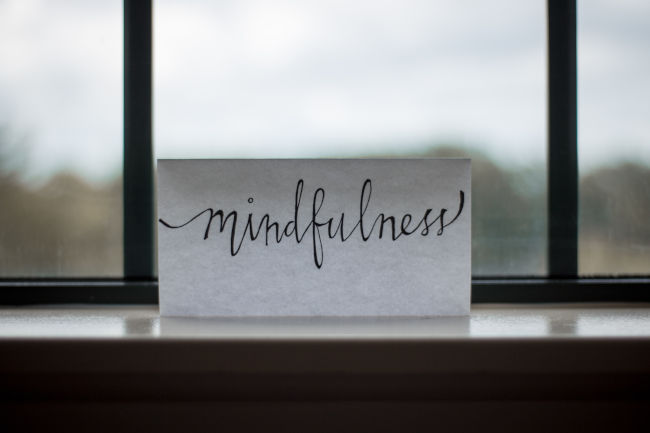
Mindfulness practice starter kit
Are you looking to take up mindfulness but don’t know where to start? Our resident mindfulness teacher Fiona Worthington has put together a 20-point mindfulness practice starter kit. It includes suggestions and recommendations to help you along your mindful journey.
- Anyone can meditate. Sometimes clients say, “but my mind is too busy.” Every body’s minds are busy.
- Mindfulness is not about clearing the mind. It’s about changing the relationship with what goes on in our head. We learn how observe our sometimes messy, and unruly minds without being submerged by its content.
- To, start all you need is a chair, or a mat or a stool and some uninterrupted time.
- Before you begin, spend some time getting comfortable, you don’t need to sit like a circus contortionist.
- You also don’t need to sit for hours – plan to do a few minutes each time, it will have legs and grow.
- People who practice yoga say when you start the first thing is “stand on your mat” and so to with mindfulness just “show up to do it”.
- Something that helps me and is one of the key principles in mindfulness, is every time we practice, we arrive as if it’s the first time, we approach each session with a beginner’s mind.
- When you start, they will suggest something to focus on, this is usually the breath.
- Bring your attention to where the breath is, it could be in your nose, your mouth, your throat your belly. See if you can follow the breath. The feeling of the breath as it flows in, and as it flows out. That’s it, that’s all you have to do.
- When you start your mind will go absolutely bonkers, it will wander all over the place. It will go to “recalling what happened over the weekend; what’s for dinner? am I doing this right? What’s the point of this? It’s really boring. When will it end?” This is all okay, this is not wrong, this is totally normal. This is what minds do. It will probably wander off hundreds, if not thousands and thousands of times.
- When you catch it wandering, try and notice where it’s gone. Then gently without giving yourself a hard time for not sticking with the plan, bring it back to the breath or whatever you are focusing on.
- Each time you spot the mind has wandered off, this is a good thing. This is the practice. This is the mindful moment. You noticed it had gone.
- With practice, just like learning to lifts heavier weights at the gym, the wanderings will get a little less, and the attention will become a little more consistent.
- Sometimes there will be OK practices, and sometimes not so OK. The most important thing is not whether a practice is good or bad – that is not the point, doesn’t matter. The only thing that matters is that you noticed.
- Don’t force anything. It’s not a competition, it’s a practice.
- Mindfulness is training for your brain to improve the ability to pay attention. This skill helps us in time to be able to observe thoughts and feelings without getting so caught up in them. To “respond rather than react.” I love that phrase.
- Mindfulness is not an instead of. It is not the holy grail, nor the solution to everything. It’s not a quick fix – it takes time. So, it may not be for everyone. It’s part of the whole lifestyle package.
- Good sleep
- Healthy Diet
- Meaningful relationships
- Life purpose
- Exercise
- The science is still new but seems to suggest that regular practice reduces stress, anxiety, depression.
- There are loads of online resources. Here are a few of my favourites: Mark Williams, Danny Penman Headspace, Oxford Mindfulness Centre or Mindfulness at the Putney Clinic. I also have included a few of the books I read when I started.
- Mindfulness a Practical Guide to Finding Peace in A frantic World, Mark Williams and Danny Penman
- The little Book of Mindfulness, Dr. Patricia Collard
- The Art of Breathing, Danny Penman
- Full Catastrophe Living, Jon Kabat -Zinn
- 10% Happier: How I Tamed the Voice in My Head, Dan Harris
- Finally and most importantly if you have had a trauma or are suffering from depression, then I would recommend a course with an experienced teacher (feel free to contact me directly for referrals)
For enquiries, send an email to info@fionaworthington.uk.com or call me on 07990 514804.
